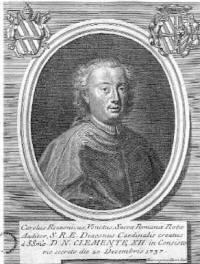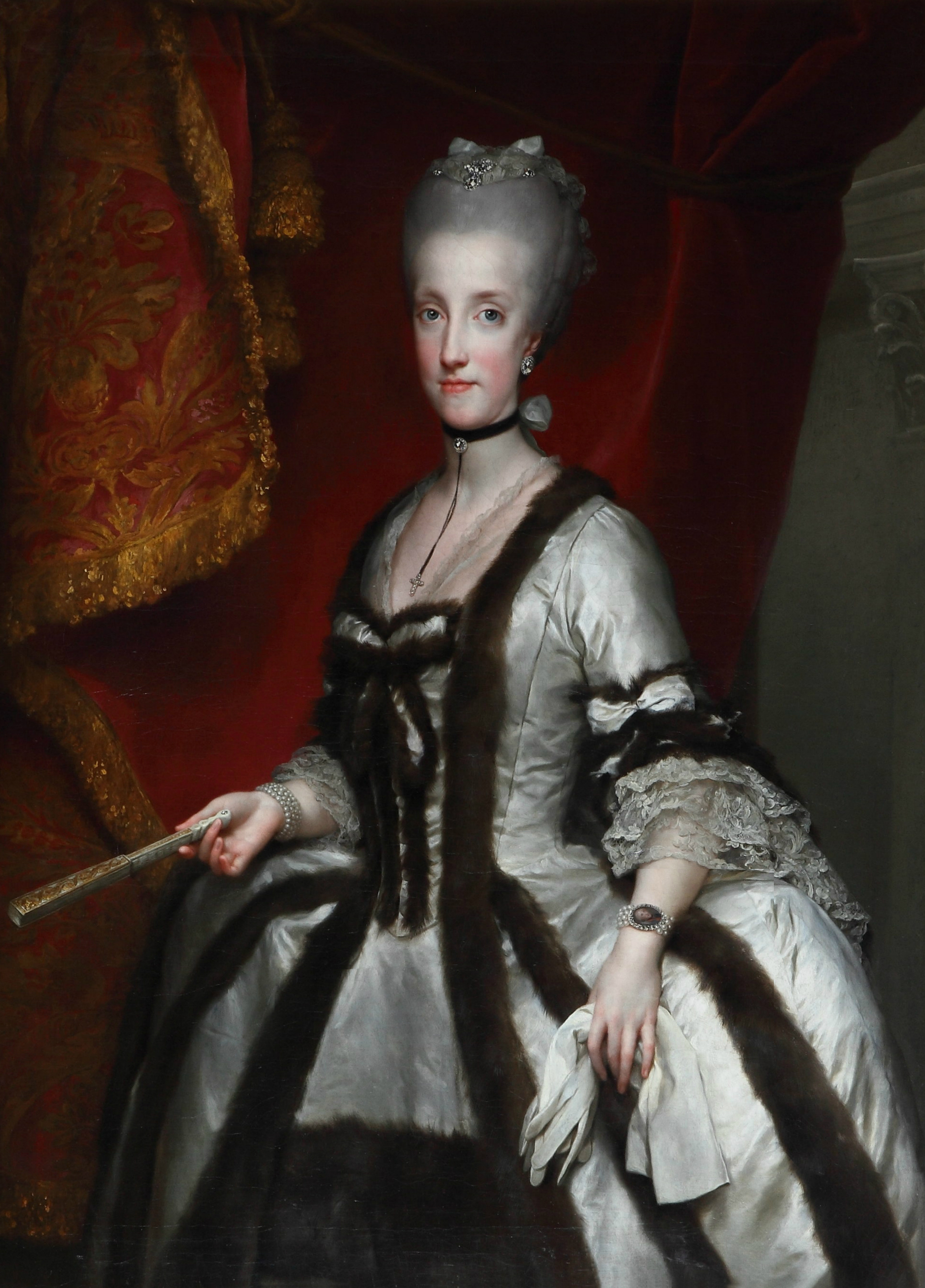|
Gaetano Boncompagni-Ludovisi
Gaetano I Boncompagni Ludovisi (1706–1777) was VII Duke of Sora and the Prince of Piombino, Marquis of Populonia, Prince of Venosa and Count of Conza, Lord di Scarlino, Populonia, Vignale, Abbadia del Fango, Suvereto, Buriano, Cerboli e Palmaiolan, and Lord prince of the Tuscan Archipelago including the islands of Elba, Montecristo, Pianosa, Gorgona, Capraia, and Isola del Giglio, from 1745 until 1777. Biography He was the eldest son of Antonio I Boncompagni (1658–1731), VI Duke of Sora and Maria Eleonora I Boncompagni (1686–1745), and inherited the titles of both his parents. A declared supporter of the Spanish claims on Naples, just as his father had been, when Charles of Bourbon reconquered the Kingdom of Naples in 1734 during the War of the Polish Succession, Boncompagni was naturally to emerge as one of the most important characters of the new Kingdom of Naples. When Charles of Bourbon made his official entry into Naples, Boncompagni was designated, together with ... [...More Info...] [...Related Items...] OR: [Wikipedia] [Google] [Baidu] |
Gaetano Boncompagni Ludovisi
Gaetano (anglicized ''Cajetan'') is an Italian masculine given name. It is also used as a surname. It is derived from the Latin ''Caietanus'', meaning "from ''Caieta''" (the modern Gaeta). The given name has been in use in Italy since medieval period, although it also remained in use as a byname indicating people from Gaeta, as in Thomas Cajetan or ''Gaetanus'' (1469–1534). The modern given name can be traced to Saint Gaetano dei Conti di Tiene (1480–1547) who was canonized in 1671. Other variants of the name exist in other Romance languages, the French form of the name is ''Gaëtan, Gaétan'', the Portuguese form is ''Caetano'', and the Spanish form is ''Cayetano''. The feminine form is ''Gaetana'' (also ''Caetana'' and ''Cayetana''). People with the given name ''Gaetano'' Clergy and religious figures * Pope Nicholas III (Giovanni Gaetano Orsini), Pope from 1277–1280 * Thomas Cajetan (Tomasso de Vio Cardinal Cajetan), (1469 – 1534), Italian philosopher, theolo ... [...More Info...] [...Related Items...] OR: [Wikipedia] [Google] [Baidu] |
Maria Amalia Of Saxony
es, María Amalia Cristina Francisca Javiera Flora Walburga , spouse = Charles III of Spain , issue = , issue-link = #Issue , house = Wettin , father = Augustus III of Poland , mother = Maria Josepha of Austria , birth_date = , birth_place = Dresden Castle, Dresden, Saxony , death_date = , death_place = Buen Retiro Palace, Madrid, Spain , burial_place = El Escorial, Spain , religion = Roman Catholicism Maria Amalia of Saxony (Maria Amalia Christina Franziska Xaveria Flora Walburga; 24 November 1724 – 27 September 1760) was born a princess of Poland and Saxony, and became Queen of Naples and Sicily from 1738 until 1759, and then Queen of Spain from 1759 until her death in 1760 by marriage to Charles III of Spain. The arranged marriage produced many children who survived into adulthood, including Charles IV of Spain. A popular consort, she oversaw the construction of the Caserta Palace outside Naples as well as ... [...More Info...] [...Related Items...] OR: [Wikipedia] [Google] [Baidu] |
1706 Births
Seventeen or 17 may refer to: *17 (number), the natural number following 16 and preceding 18 * one of the years 17 BC, AD 17, 1917, 2017 Literature Magazines * ''Seventeen'' (American magazine), an American magazine * ''Seventeen'' (Japanese magazine), a Japanese magazine Novels * ''Seventeen'' (Tarkington novel), a 1916 novel by Booth Tarkington *''Seventeen'' (''Sebuntiin''), a 1961 novel by Kenzaburō Ōe * ''Seventeen'' (Serafin novel), a 2004 novel by Shan Serafin Stage and screen Film * ''Seventeen'' (1916 film), an American silent comedy film *''Number Seventeen'', a 1932 film directed by Alfred Hitchcock * ''Seventeen'' (1940 film), an American comedy film *''Eric Soya's '17''' (Danish: ''Sytten''), a 1965 Danish comedy film * ''Seventeen'' (1985 film), a documentary film * ''17 Again'' (film), a 2009 film whose working title was ''17'' * ''Seventeen'' (2019 film), a Spanish drama film Television * ''Seventeen'' (TV drama), a 1994 UK dramatic short starring Christi ... [...More Info...] [...Related Items...] OR: [Wikipedia] [Google] [Baidu] |
Princes Of Piombino
The Lordship of Piombino (''Signoria di Piombino''), and after 1594 the Principality of Piombino (''Principato di Piombino''), was a small state on the Italian peninsula centred on the city of Piombino and including part of the island of Elba. It existed from 1399 to 1805, when it was merged into the Principality of Lucca and Piombino. In 1815 it was absorbed into the Grand Duchy of Tuscany. History On February 19, 1399 Gherardo Appiani ceded Pisa, which his family had owned since 1392, to the Visconti of Milan for 200,000 florins, reserving Piombino for himself and his successors, becoming its lord; moreover he also took possession of Populonia, Suvereto, Scarlino, Buriano, Abbey of San Pancrazio al Fango and the islands of Pianosa, Montecristo, and Elba; making Piombino the capital of this newly created state. Gherardo had his residence built in Piombino in the small square (now Piazza Bovio) and on his death, in 1405, he left the state to his son Iacopo II. The latter, b ... [...More Info...] [...Related Items...] OR: [Wikipedia] [Google] [Baidu] |
Pope Clement XIII
Pope Clement XIII ( la, Clemens XIII; it, Clemente XIII; 7 March 1693 – 2 February 1769), born Carlo della Torre di Rezzonico, was head of the Catholic Church and ruler of the Papal States from 6 July 1758 to his death in February 1769. He was installed on 16 July 1758. His pontificate was overshadowed by the constant pressure to suppress the Society of Jesus but despite this, he championed their order and also proved to be their greatest defender at that time. He was also one of the few early popes who favoured dialogue with Protestants and to this effect hoped to mend the schism with the Catholic Church that existed in England and the Low Countries. These efforts ultimately bore little fruit. Biography Early life Carlo della Torre di Rezzonico was born in 1693 to a recently ennobled family of Venice, the second of two children of the man who bought the unfinished palace on the Grand Canal (now Ca' Rezzonico) and finished its construction. His parents were Giovanni Ba ... [...More Info...] [...Related Items...] OR: [Wikipedia] [Google] [Baidu] |
Ignazio Boncompagni-Ludovisi
Ignazio Gaetano Boncompagni-Ludovisi (18 June 1743, – 9 August 1790) was a priest and cardinal of the Roman Catholic Church. Life Born to an aristocratics, Gaetano Boncompagni, Prince of Piombino and Duke of Sora, and Laura Chigi, of the princes of Farnese. The families had multiple popes in their lineage: the Boncompagni had Pope Gregory XIII (1502 – 1585); the Chigi had Pope Alexander VII (1599 – 1667); and the Ludovisi had Pope Gregory XV (1554 – 1623). As the second son, he elected an ecclesiastical career. He studied at the Sapienza University, and earned a doctorate in law in 1765. Since 1754, Pope Benedict XIV gave his family all the benefices of the patronage that the Boncompagni Ludovisi exercised in the dioceses of Aquino and Sora, vacant since the resignation of Cardinal Pier Luigi Carafa. In 1763, he was named by a bull of Pope Clement XIII as the archimandrite of the monastery of Sant'Adriano, diocese of Rossano; and abbot commendatario of Santa Maria di G ... [...More Info...] [...Related Items...] OR: [Wikipedia] [Google] [Baidu] |
Antonio II Boncompagni Ludovisi
Antonio II Boncompagni Ludovisi (1735–1805) was the Prince of Piombino, Marquis of Populonia, Prince of Venosa and Count of Conza, Lord di Scarlino, Populonia, Vignale, Abbadia del Fango, Suvereto, Buriano, Cerboli e Palmaiolan, and Lord prince of the Tuscan Archipelago including the islands of Elba, Montecristo, Pianosa, Gorgona, Capraia, and Isola del Giglio Isola del Giglio (; en, Giglio Island, lat, Igilium) is an Italian island and comune in the Tyrrhenian Sea, off the coast of Tuscany, and is part of the Province of Grosseto. The island is one of seven that form the Tuscan Archipelago, lying w ..., from 1733 until he was deposed in 1801. References * Mauro Carrara, Signori e principi di Piombino, Bandecchi & Vivaldi, Pontedera 1996. {{Authority control Princes of Piombino 1735 births 1805 deaths ... [...More Info...] [...Related Items...] OR: [Wikipedia] [Google] [Baidu] |
Queen Maria Carolina
Maria Carolina Louise Josepha Johanna Antonia (13 August 1752 – 8 September 1814) was List of consorts of Naples, Queen of Naples and List of Sicilian consorts, Sicily as the wife of King Ferdinand I of the Two Sicilies. As ''de facto'' ruler of her husband's kingdoms, Maria Carolina oversaw the promulgation of many reforms, including the revocation of the ban on Freemasonry, the enlargement of the navy under her favorite, Sir John Acton, 6th Baronet, Sir John Acton and the expulsion of Spanish influence. She was a proponent of enlightened absolutism until the advent of the French Revolution, when, in order to prevent its ideas gaining currency, she made Naples a police state. Born an archduchess of Austria, the thirteenth child of Empress Maria Theresa and Francis I, Holy Roman Emperor, Emperor Francis I, Maria Carolina married Ferdinand as part of an Austrian alliance with Spain, of which Charles III of Spain, Ferdinand's father was king. Following the birth of a male heir in ... [...More Info...] [...Related Items...] OR: [Wikipedia] [Google] [Baidu] |



